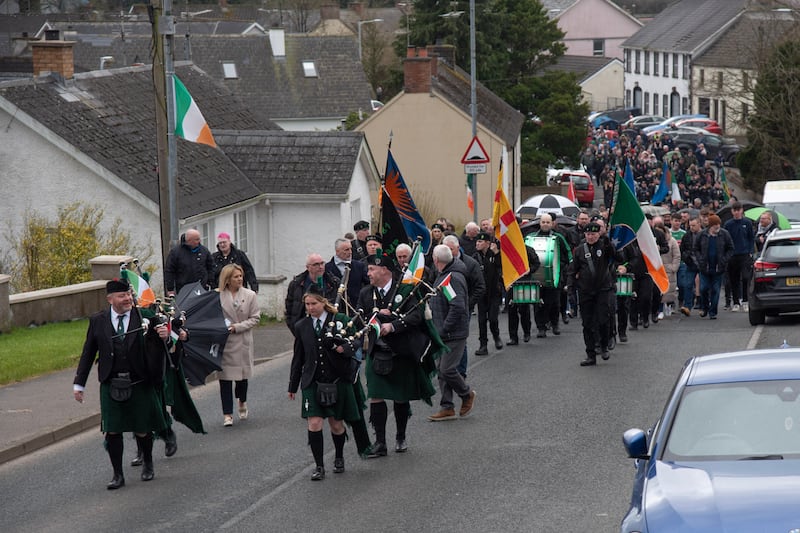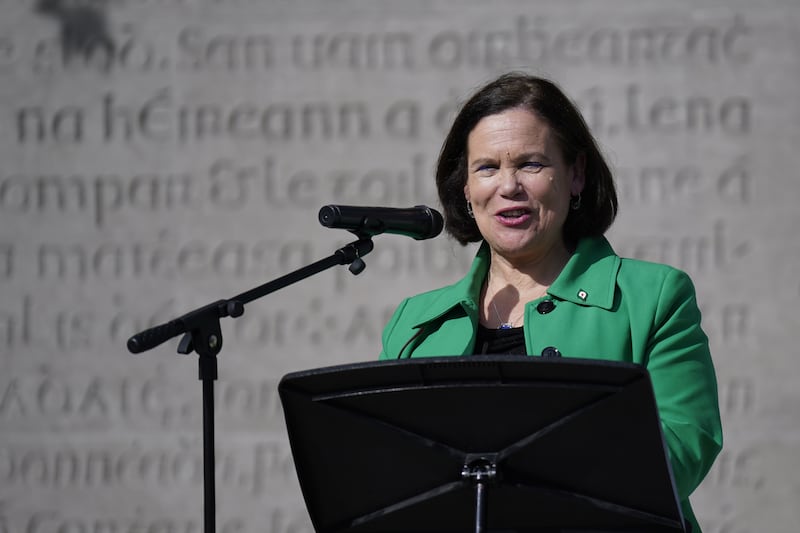President Michael D Higgins has suggested Britain's "imperial triumphalism" be re-examined in the same way as Irish republicanism has been over recent years.
In a keynote speech at an event marking Ireland's Easter Rising against British rule a century ago, Mr Higgins said there has been much discussion of violence by Irish nationalists at the turn of the last century.
But he noted the "supremacist and militarist imperialism" of Britain over the same time had not been reviewed with "the same fault-finding edge".
"In the context of 1916, this imperial triumphalism can be traced, for example, in the language of the (British Army) recruitment campaigns of the time, which evoked mythology, masculinity and religion, and glorified the Irish blood as having 'reddened the earth of every continent'," he said.
"But this is for another day."
Mr Higgins made the remarks at a talk entitled Remembering 1916 at Dublin's Mansion House, home of the first independent parliament in Ireland after the rebellion.
The President said there "has been a great deal of critical reassessment of aspects of the Rising and, in particular, of the myths of redemptive violence that were at the heart, not just of Irish nationalism, but also of imperial nationalism".
He added: "My view is that the latter has not, perhaps, been revisited with the same fault-finding edge as the former.
"Indeed, while the long shadow cast by what has been called 'the Troubles' in Northern Ireland has led to a scrutiny of the Irish Republican tradition of 'physical violence', a similar review of supremacist and militarist imperialism remains to be fully achieved."
Mr Higgins described the leaders of the 1916 rebellion - who were executed by Britain - as "advanced thinkers, selfless women and men, who took all the risks to ensure that the children of Ireland would, in the future, live in freedom and access their fair share of Ireland's prosperity".
But he added their vision was not realised in the founding years of the new Irish State.
Mr Higgins said Irish people have a duty to retrieve the idealism at the heart of the Easter Rising.
"But we have a greater duty to imagine and to forge a future illuminated by the unfulfilled promises of our past," he said.
"All of us are invited, then, in this year of 2016, to reach for the ideals and hopes that animated so many of the men and women of 1916 in their struggle for freedom, equality and social justice.
"Informed by the manifest needs of our times, let us test again these ideals; let us retrieve the courage, the utopianism, of 1916 - and let us add to it, as we craft, together, a new and inspiring vision for the coming generations.
"Let us revive the best of the promise of 1916, so that those coming generations might experience freedom in the full sense of the term - freedom from poverty, freedom from violence and insecurity, and freedom from fear."
Mr Higgins made his remarks as wreaths were laid at seven locations around Dublin which were key to the revolt.
Rebels took up positions a century ago on Easter Monday at Boland's Mill, the Jacob's Factory on Bishop Street, City Hall, The Four Courts, The Royal College of Surgeons, Moore Street and the South Dublin Union on the site of the present-day St James' Hospital.
The makeshift garrisons were chosen for their strategic locations and proximity to British Army strongholds in the capital.
Wreaths were also laid in Athenry, Cork, Enniscorthy and Ashbourne.
During the day, more than 500 free talks, exhibitions, debates, films, performances and dramatisations were put on to explore the tumultuous events which played a pivotal role in shaping Ireland.
The Easter Rising was a military failure for the revolutionaries, who included poets, journalists and teachers, but it ultimately led to the partition of Ireland and the creation of an independent Republic as well as Northern Ireland.
Hundreds of thousands of people lined the streets of the Irish capital on Sunday for a huge military parade, a centrepiece event in a year of celebrations marking one of the most defining episodes of Irish history.
President Higgins laid a wreath outside the General Post Office, the former rebel headquarters.
After Captain Peter Kelleher re-enacted the reading of the Proclamation, spontaneous applause erupted from the onlookers. Scores of descendants of the rebels looked on.
Former presidents Mary McAleese and Mary Robinson, former taoisigh Bertie Ahern and Brian Cowen, Dublin Lord Mayor Criona Ni Dhalaigh as well as Northern Ireland Deputy First Minister Martin McGuinness, Garda chief Noirin O'Sullivan and British ambassador to Ireland Dominick Chilcott were among the dignitaries attending.
As part of the ceremony, children representing the four provinces of Ireland - Ulster, Leinster, Connacht and Munster - laid daffodils under the portico of the GPO as a lone piper played Down By The Sally Gardens.
Fr Seamus Madigan, head chaplain of the Defence Forces, said the flower-laying was a "symbol of the unshakeable resolve to live together on this island in peace and harmony".






